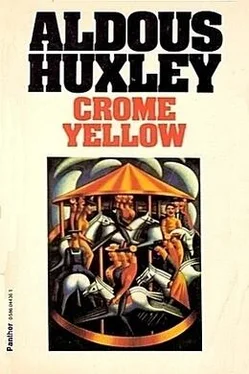Sudden and silent as a phantom Mrs. Bodiham appeared, gliding noiselessly across the room. Above her black dress her face was pale with an opaque whiteness, her eyes were pale as water in a glass, and her strawy hair was almost colourless. She held a large envelope in her hand.
"This came for you by the post," she said softly.
The envelope was unsealed. Mechanically Mr. Bodiham tore it open. It contained a pamphlet, larger than his own and more elegant in appearance. "The House of Sheeny, Clerical Outfitters, Birmingham." He turned over the pages. The catalogue was tastefully and ecclesiastically printed in antique characters with illuminated Gothic initials. Red marginal lines, crossed at the corners after the manner of an Oxford picture frame, enclosed each page of type, little red crosses took the place of full stops. Mr. Bodiham turned the pages.
"Soutane in best black merino. Ready to wear; in all sizes. Clerical frock coats. From nine guineas. A dressy garment, tailored by our own experienced ecclesiastical cutters."
Half–tone illustrations represented young curates, some dapper, some Rugbeian and muscular, some with ascetic faces and large ecstatic eyes, dressed in jackets, in frock–coats, in surplices, in clerical evening dress, in black Norfolk suitings.
"A large assortment of chasubles.
"Rope girdles.
"Sheeny's Special Skirt Cassocks. Tied by a string about the waist…When worn under a surplice presents an appearance indistinguishable from that of a complete cassock…Recommended for summer wear and hot climates."
With a gesture of horror and disgust Mr. Bodiham threw the catalogue into the waste–paper basket. Mrs. Bodiham looked at him; her pale, glaucous eyes reflected his action without comment.
"The village," she said in her quiet voice, "the village grows worse and worse every day."
"What has happened now?" asked Mr. Bodiham, feeling suddenly very weary.
"I'll tell you." She pulled up a brown varnished chair and sat down. In the village of Crome, it seemed, Sodom and Gomorrah had come to a second birth.
Denis did not dance, but when ragtime came squirting out of the pianola in gushes of treacle and hot perfume, in jets of Bengal light, then things began to dance inside him. Little black nigger corpuscles jigged and drummed in his arteries. He became a cage of movement, a walking palais de danse. It was very uncomfortable, like the preliminary symptoms of a disease. He sat in one of the window–seats, glumly pretending to read.
At the pianola, Henry Wimbush, smoking a long cigar through a tunnelled pillar of amber, trod out the shattering dance music with serene patience. Locked together, Gombauld and Anne moved with a harmoniousness that made them seem a single creature, two–headed and four–legged. Mr. Scogan, solemnly buffoonish, shuffled round the room with Mary. Jenny sat in the shadow behind the piano, scribbling, so it seemed, in a big red notebook. In arm–chairs by the fireplace, Priscilla and Mr. Barbecue–Smith discussed higher things, without, apparently, being disturbed by the noise on the Lower Plane.
"Optimism," said Mr. Barbecue–Smith with a tone of finality, speaking through strains of the "Wild, Wild Women"—"optimism is the opening out of the soul towards the light; it is an expansion towards and into God, it is a h–piritual self–unification with the Infinite."
"How true!" sighed Priscilla, nodding the baleful splendours of her coiffure.
"Pessimism, on the other hand, is the contraction of the soul towards darkness; it is a focusing of the self upon a point in the Lower Plane; it is a h–piritual slavery to mere facts; to gross physical phenomena."
"They're making a wild man of me." The refrain sang itself over in Denis's mind. Yes, they were; damn them! A wild man, but not wild enough; that was the trouble. Wild inside; raging, writhing—yes, "writhing" was the word, writhing with desire. But outwardly he was hopelessly tame; outwardly—baa, baa, baa.
There they were, Anne and Gombauld, moving together as though they were a single supple creature. The beast with two backs. And he sat in a corner, pretending to read, pretending he didn't want to dance, pretending he rather despised dancing. Why? It was the baa–baa business again.
Why was he born with a different face? Why WAS he? Gombauld had a face of brass—one of those old, brazen rams that thumped against the walls of cities till they fell. He was born with a different face—a woolly face.
The music stopped. The single harmonious creature broke in two. Flushed, a little breathless, Anne swayed across the room to the pianola, laid her hand on Mr. Wimbush's shoulder.
"A waltz this time, please, Uncle Henry," she said.
"A waltz," he repeated, and turned to the cabinet where the rolls were kept. He trod off the old roll and trod on the new, a slave at the mill, uncomplaining and beautifully well bred. "Rum; Tum; Rum–ti–ti; Tum–ti–ti…" The melody wallowed oozily along, like a ship moving forward over a sleek and oily swell. The four–legged creature, more graceful, more harmonious in its movements than ever, slid across the floor. Oh, why was he born with a different face?
"What are you reading?"
He looked up, startled. It was Mary. She had broken from the uncomfortable embrace of Mr. Scogan, who had now seized on Jenny for his victim.
"What are you reading?"
"I don't know," said Denis truthfully. He looked at the title page; the book was called "The Stock Breeder's Vade Mecum."
"I think you are so sensible to sit and read quietly," said Mary, fixing him with her china eyes. "I don't know why one dances. It's so boring."
Denis made no reply; she exacerbated him. From the arm–chair by the fireplace he heard Priscilla's deep voice.
"Tell me, Mr Barbecue–Smith—you know all about science, I know—" A deprecating noise came from Mr. Barbecue–Smith's chair. "This Einstein theory. It seems to upset the whole starry universe. It makes me so worried about my horoscopes. You see…"
Mary renewed her attack. "Which of the contemporary poets do you like best?" she asked. Denis was filled with fury. Why couldn't this pest of a girl leave him alone? He wanted to listen to the horrible music, to watch them dancing—oh, with what grace, as though they had been made for one another!—to savour his misery in peace. And she came and put him through this absurd catechism! She was like "Mangold's Questions": "What are the three diseases of wheat?"—"Which of the contemporary poets do you like best?"
"Blight, Mildew, and Smut," he replied, with the laconism of one who is absolutely certain of his own mind.
It was several hours before Denis managed to go to sleep that night. Vague but agonising miseries possessed his mind. It was not only Anne who made him miserable; he was wretched about himself, the future, life in general, the universe. "This adolescence business," he repeated to himself every now and then, "is horribly boring." But the fact that he knew his disease did not help him to cure it.
After kicking all the clothes off the bed, he got up and sought relief in composition. He wanted to imprison his nameless misery in words. At the end of an hour, nine more or less complete lines emerged from among the blots and scratchings.
"I do not know what I desire When summer nights are dark and still, When the wind's many–voiced quire Sleeps among the muffled branches. I long and know not what I will: And not a sound of life or laughter stanches Time's black and silent flow. I do not know what I desire, I do not know."
He read it through aloud; then threw the scribbled sheet into the waste–paper basket and got into bed again. In a very few minutes he was asleep.
Читать дальше











